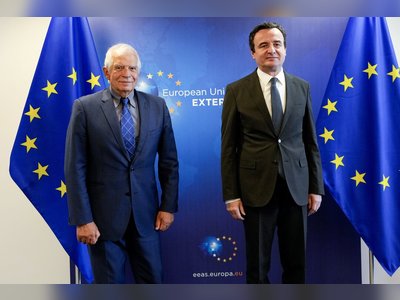Friedrich Merz Assumes Office as Chancellor of Germany Amidst Political Turmoil
The new chancellor faces significant challenges within a divided nation as he prepares to navigate complex socio-economic issues.
Friedrich Merz has officially taken office as Chancellor of Germany, succeeding Angela Merkel at a time marked by a reevaluation of the country’s socio-economic landscape.
Merz's tenure follows a tumultuous election campaign that saw him facing significant backlash within his own party, the Christian Democratic Union (CDU), due to his hardline policies on migration.
His strategies included engaging with far-right sentiments, a move analysts indicate has led to fragmentation within centrist parties traditionally focused on consensus in the Bundestag.
This approach has spurred mass protests and has drawn rare public criticism from Angela Merkel herself.
Despite public discontent, Merz remained resolute and refused to step down after the elections, although he expressed a desire for a different outcome.
The 69-year-old conservative's installation as chancellor arrives at a time when the post-war promise of 'Wohlstand für Alle' (prosperity for all) is increasingly under threat amid rising inequality, with one-fifth of the German population facing poverty or social exclusion.
Germany continues to grapple with historical divides between East and West, while new fault lines emerge that separate secure professional classes from the precarious working class, older generations from younger ones, urban areas from rural locales, and homeowners from renters.
Infrastructure decay is evident, with roads and rail systems deteriorating, digital networks lagging behind modern demands, and an educational system struggling to prepare a shrinking workforce for the evolving job market.
The country’s industrial foundation is reportedly crumbling under the pressure of high energy costs, outdated technology, and stifling bureaucracy.
Traditional automotive giants are faltering, caught between domestic confidence and increasing competition from China.
Trade conflicts, initiated during Donald Trump's presidency, have illuminated Germany's reliance on exports as a potential vulnerability, compounded by the threat of war underscored by Vladimir Putin's aggression.
In a notable political shift, the anti-EU and pro-Russian party, Alternative for Germany (AfD), has consolidated its support and is now polling to equal Merz's CDU bloc, challenging the long-standing assumption that Germany’s history would protect it from the allure of nationalist populism.
The domestic intelligence agency classified the AfD as a 'confirmed far-right extremist' force last week, a stance that could further complicate national dialogues.
As Germany navigates these challenges, the need for a unifying leader is more pronounced than ever.
Nonetheless, Merz's approach has drawn comparisons to political figures like David Cameron, particularly in his handling of populist currents.
His contentious migration legislation recalls Cameron's fateful gamble with Brexit, both leaders having aimed to capitalize on rising populist sentiments at their own peril.
In the weeks following his electoral victory, Merz exhibited unpredictable behavior, reversing stances taken during his campaign, particularly in relation to securing partnerships with the Social Democrats in order to form a governing coalition.
His previously staunch advocacy for fiscal restraint has shifted dramatically, as he has sought constitutional amendments to enable significant borrowing for defense and infrastructure, exceeding hundreds of billions of euros.
The alteration to the Schuldenbremse, a fiscal rule instituted in 2009 to maintain fiscal discipline and control public debt, has been met with apprehension among conservative allies who worry that he is conceding too much ground to the left.
In response, Merz has committed to reduce spending, often at the expense of the most vulnerable groups in German society.
Academically trained as a corporate lawyer, Merz possesses no prior experience overseeing a federal state, ministry, or even a municipal council.
His previous exit from politics followed his challenges in ascending the ranks overshadowed by Merkel, returning only after a power vacuum was created by her departure.
His leadership victory within the CDU required multiple attempts.
Traditionally, instead of fostering unity, Merz has deepened divisions.
His proposal of a Leitkultur, or 'leading culture,' aimed at integrating migrants has again sparked debate, suggesting that the act of purchasing a Christmas tree epitomizes being a 'true German'—a sentiment that could alienate Jewish, Muslim, Hindu, and secular communities within Germany.
Furthermore, his derogatory remarks about migrant children, allegations against Ukrainian refugees, and claims concerning foreign misuse of the health system have drawn significant backlash, with the German Dental Association publicly contesting his incendiary remarks.
Amid these controversies, Merz's approval rating lingers at approximately 36%, slightly better than left-wing politician Heidi Reine and co-leader of the AfD, Alice Weidel, according to recent surveys.
The AfD’s designation as an extremist organization may inadvertently reinforce their anti-establishment narrative rather than diminish their influence.
Tensions in transatlantic relations have escalated, highlighted by U.S. Secretary of State Marco Rubio's condemnation of the German intelligence classification.
For Merz to shift the current trajectory of his administration, he faces the urgent task of articulating a clear vision that addresses the needs of all Germans while promoting his ambitious spending initiatives.
Merz's bold assertion that 'Germany is back on the world stage' is not yet substantiated by concrete and communicative objectives for the populace.
Without a significant recalibration in governance, the alternative narrative presented by the AfD may grow more appealing as they appeal to populist sentiments and further entrench societal divisions.
Merz's tenure follows a tumultuous election campaign that saw him facing significant backlash within his own party, the Christian Democratic Union (CDU), due to his hardline policies on migration.
His strategies included engaging with far-right sentiments, a move analysts indicate has led to fragmentation within centrist parties traditionally focused on consensus in the Bundestag.
This approach has spurred mass protests and has drawn rare public criticism from Angela Merkel herself.
Despite public discontent, Merz remained resolute and refused to step down after the elections, although he expressed a desire for a different outcome.
The 69-year-old conservative's installation as chancellor arrives at a time when the post-war promise of 'Wohlstand für Alle' (prosperity for all) is increasingly under threat amid rising inequality, with one-fifth of the German population facing poverty or social exclusion.
Germany continues to grapple with historical divides between East and West, while new fault lines emerge that separate secure professional classes from the precarious working class, older generations from younger ones, urban areas from rural locales, and homeowners from renters.
Infrastructure decay is evident, with roads and rail systems deteriorating, digital networks lagging behind modern demands, and an educational system struggling to prepare a shrinking workforce for the evolving job market.
The country’s industrial foundation is reportedly crumbling under the pressure of high energy costs, outdated technology, and stifling bureaucracy.
Traditional automotive giants are faltering, caught between domestic confidence and increasing competition from China.
Trade conflicts, initiated during Donald Trump's presidency, have illuminated Germany's reliance on exports as a potential vulnerability, compounded by the threat of war underscored by Vladimir Putin's aggression.
In a notable political shift, the anti-EU and pro-Russian party, Alternative for Germany (AfD), has consolidated its support and is now polling to equal Merz's CDU bloc, challenging the long-standing assumption that Germany’s history would protect it from the allure of nationalist populism.
The domestic intelligence agency classified the AfD as a 'confirmed far-right extremist' force last week, a stance that could further complicate national dialogues.
As Germany navigates these challenges, the need for a unifying leader is more pronounced than ever.
Nonetheless, Merz's approach has drawn comparisons to political figures like David Cameron, particularly in his handling of populist currents.
His contentious migration legislation recalls Cameron's fateful gamble with Brexit, both leaders having aimed to capitalize on rising populist sentiments at their own peril.
In the weeks following his electoral victory, Merz exhibited unpredictable behavior, reversing stances taken during his campaign, particularly in relation to securing partnerships with the Social Democrats in order to form a governing coalition.
His previously staunch advocacy for fiscal restraint has shifted dramatically, as he has sought constitutional amendments to enable significant borrowing for defense and infrastructure, exceeding hundreds of billions of euros.
The alteration to the Schuldenbremse, a fiscal rule instituted in 2009 to maintain fiscal discipline and control public debt, has been met with apprehension among conservative allies who worry that he is conceding too much ground to the left.
In response, Merz has committed to reduce spending, often at the expense of the most vulnerable groups in German society.
Academically trained as a corporate lawyer, Merz possesses no prior experience overseeing a federal state, ministry, or even a municipal council.
His previous exit from politics followed his challenges in ascending the ranks overshadowed by Merkel, returning only after a power vacuum was created by her departure.
His leadership victory within the CDU required multiple attempts.
Traditionally, instead of fostering unity, Merz has deepened divisions.
His proposal of a Leitkultur, or 'leading culture,' aimed at integrating migrants has again sparked debate, suggesting that the act of purchasing a Christmas tree epitomizes being a 'true German'—a sentiment that could alienate Jewish, Muslim, Hindu, and secular communities within Germany.
Furthermore, his derogatory remarks about migrant children, allegations against Ukrainian refugees, and claims concerning foreign misuse of the health system have drawn significant backlash, with the German Dental Association publicly contesting his incendiary remarks.
Amid these controversies, Merz's approval rating lingers at approximately 36%, slightly better than left-wing politician Heidi Reine and co-leader of the AfD, Alice Weidel, according to recent surveys.
The AfD’s designation as an extremist organization may inadvertently reinforce their anti-establishment narrative rather than diminish their influence.
Tensions in transatlantic relations have escalated, highlighted by U.S. Secretary of State Marco Rubio's condemnation of the German intelligence classification.
For Merz to shift the current trajectory of his administration, he faces the urgent task of articulating a clear vision that addresses the needs of all Germans while promoting his ambitious spending initiatives.
Merz's bold assertion that 'Germany is back on the world stage' is not yet substantiated by concrete and communicative objectives for the populace.
Without a significant recalibration in governance, the alternative narrative presented by the AfD may grow more appealing as they appeal to populist sentiments and further entrench societal divisions.
AI Disclaimer: An advanced artificial intelligence (AI) system generated the content of this page on its own. This innovative technology conducts extensive research from a variety of reliable sources, performs rigorous fact-checking and verification, cleans up and balances biased or manipulated content, and presents a minimal factual summary that is just enough yet essential for you to function as an informed and educated citizen. Please keep in mind, however, that this system is an evolving technology, and as a result, the article may contain accidental inaccuracies or errors. We urge you to help us improve our site by reporting any inaccuracies you find using the "Contact Us" link at the bottom of this page. Your helpful feedback helps us improve our system and deliver more precise content. When you find an article of interest here, please look for the full and extensive coverage of this topic in traditional news sources, as they are written by professional journalists that we try to support, not replace. We appreciate your understanding and assistance.










